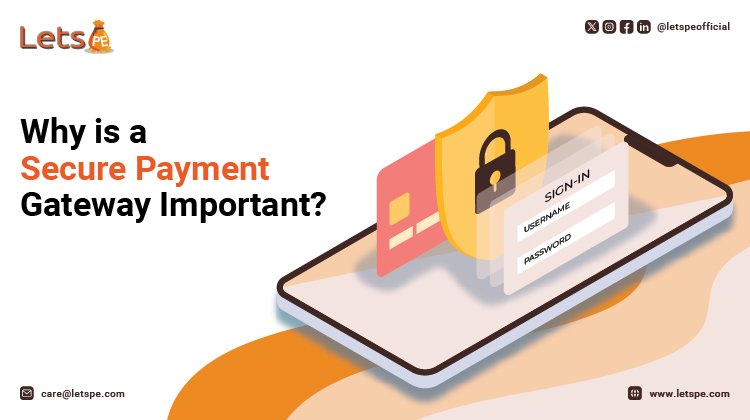Why is a secure payment gateway important

With the second-largest internet user base, India currently has around 350 million clients who use digital payments across persistence similar as e-commerce, trip, hospitality, and entertainment. While users pay online, payment security remains an essential interest. The security and privacy of the users’ information come as important factors for businesses merchandisers when selecting a payment gateway, as the RBI mandatorily requires their compliance with certain security measures.
What is a Payment Gateway?

A payment gateway allows you to accept payments through multiple payment methods, similar as debit/credit cards, digital wallets, UPI, and others. Anyone who runs an online business (called a merchant) needs a payment gateway as a common platform to allow payments from multiple sources in their business account from their website.
Ensuring Safe Online Payments with a Secure Payment Gateway

The main reason why every merchant needs a safe and secure payment gateway is that when frauds happen, merchants may get chargebacks, and they've to repay the client whose account was used for fraudulent transactions.
Hence, data security is relatively important for merchants, and the first step is to have a secure payment gateway.
Data Encryption
It's a process of encrypting the data entered using a public key. When the information is transferred through the payment processor, the acquiring bank will break the details using a private key (OTPs or other authorization styles). Therefore, it becomes relatively delicate to steal payment information, and the chances of payment fraud reduce absolutely.
PCI DSS Compliance
Compliance standards and rules related to payments are handed in the Payment Card Industry Data Security Standard, PCI DSS. Therefore, you as a merchant, you and the payment gateway company, must stick to these standards’ provisions if you accept card payments.
Some most common PCI DSS measures that the merchants and PGs must consent with include
Security of the cardholder’s data
- Restriction on the use of the vendor-supplied defaults for system passwords
- Regulating all access to cardholder data and network resources
- Installation of firewall configuration
- Policy maintenance to address information security
- Updating anti-virus software or programs regularly
- Assigning a unique ID to each customer with computer access
- Encryption of the cardholder’s data transmission across public networks
- Access restriction to cardholder’s data by business
- Development of secure systems and applications
- Physical access restriction to cardholder’s data
- Testing security systems and processes regularly
Tokenization
As instructed by the RBI (Reserve Bank of India), as merchants you can not store card details of a client. Card tokenization converts guests’ sensitive card details into a security memorializing using mincing, encryption, commemorative, and security keys.
The RBI regulations allow PGs to create a unique commemorative of your client’s card details and use it for unborn payments so that clients’ details are secured and you, as a merchant, remain in RBI regulations comfortable business.
Thus, you must ensure your payment gateway complies with the tokenization rules.
Secure Electronic Transactions (SET)

Developed in association with Mastercard and VISA, the secure electronic deal is a digital protocol and frame for you to secure your clients’ payment details. The structure requires payment gateways to hide users’ sensitive payment details to help unauthorized access to them.
Read in Detail - Document Checklist for Payment Gateways in India
3D Secure 2.0 (3DS2.0)
EMVCo (global specialized body easing protocols for secure payments) issued authentication protocol 3D Secure 2.0 to give clients authentication for online payments. The purpose of setting up a 3D Secure 2.0 protocol is to give clients an extra sub caste of protection for online payment authentication. When your clients enter payment details and confirm payment, they admit an extra step where they enter 3D secure pins or passwords to verify with their banks.
Secure Socket Layer (SSL)

Supported by all web cybercitizens, SSL ensures secure data transmission between a web cyber citizen (of the client) and the payment service provider. Your website should give SSL security technology for every payment that transitions through it. Still, if your website doesn't have the SSL installed, the payment gateways will insure to give the SSL link to the cybercitizens so that the information is transferred securely.
Conclusion
The safety and security of your client’s financial information should be a top priority for every business. Therefore, by selecting a payment gateway that sticks to strict security measures, you not only cover your clients from the trouble of fraud but also secured the character of your business. Select a payment gateway that provides strong security features and a comfortable payment gateway system.












